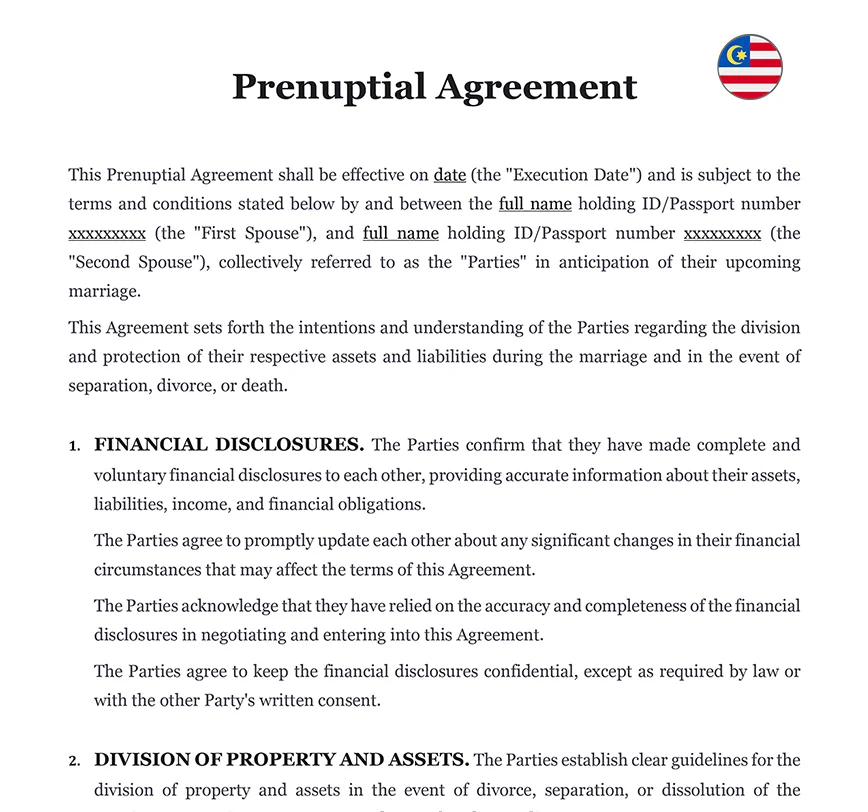
Download this prenuptial agreement to define how assets and liabilities will be divided between two people before they get married in the event of divorce or separation.

Word Document (.docx)

Ready to use legal template
Drafted by experienced lawyers
Compliant with Malaysian law
Ready to use legal template
Drafted by lawyers
Compliant with Malaysian law
Prenuptial agreements, also known as prenups, are legal documents that play a significant role in family law, particularly in the context of marriage and divorce. A prenuptial agreement is a contract entered into by a couple before they get married or enter into a civil partnership, which sets out the rights and obligations of each party in the event of a future separation or divorce. Themis Partner offers you an easy to edit Prenuptial Agreement drafted by lawyers to comply with the law in Malaysia.
A prenuptial agreement, commonly referred to as a prenup, is a legally binding contract entered into by a couple before their marriage or civil partnership. It outlines the rights and responsibilities of each spouse regarding the division of assets, property, debts, and other financial matters in the event of a divorce, separation, or death. They are designed to provide clarity and certainty, allowing couples to protect their individual assets, safeguard family businesses, and establish provisions for spousal support or the distribution of property acquired during the marriage. By addressing these matters in advance, a prenuptial agreement can help reduce potential disputes and uncertainties during times of marital breakdown, providing a framework for the fair resolution of financial matters.
A prenuptial agreement can have a significant impact on the distribution of assets in the event of a divorce. The agreement allows couples to determine in advance how their assets and property will be divided, providing a framework for the resolution of financial matters. It may outline specific provisions regarding the ownership and distribution of assets acquired before and during the marriage. It can address various aspects, such as the division of marital property, allocation of debts, treatment of separate property, and potential spousal support or alimony. By having the document in place, couples can have greater control over the distribution of assets, as the terms of the agreement will be considered during divorce proceedings. However, it is important to note that the enforceability and validity may vary based on jurisdiction and adherence to legal requirements.
The agreement should outline how the assets, including properties, investments, and financial accounts, will be divided in the event of divorce or separation.
It should define what constitutes separate property, which typically includes assets acquired before the marriage, inheritances, and gifts, and how such property will be treated in the event of a divorce.
The prenuptial agreement may address how debts and liabilities acquired individually or jointly during the marriage will be allocated between the spouses.
It can establish provisions for spousal support or alimony, such as the amount, duration, or waiver of spousal support in the event of divorce or separation.
If either spouse owns a business or professional practice, it may specify the ownership, control, and division of such assets in case of divorce.
The agreement might address provisions related to estate planning, including the distribution of assets upon death or the protection of inheritance rights of children from previous relationships.
It may include provisions for alternative dispute resolution methods, such as mediation or arbitration, to resolve any conflicts or disagreements that may arise.
In certain circumstances, a prenuptial agreement can override or modify the provisions of family law to a certain extent. However, the extent to which the document can override family law provisions varies depending on the jurisdiction and the specific laws in place. Generally, a well-drafted and enforceable agreement can provide an alternative arrangement for the distribution of assets, spousal support, and other financial matters, which may differ from what would typically be dictated by family law. It allows couples to customise their own set of rules and arrangements based on their unique circumstances and preferences. However, it’s important to note that it cannot override certain non-negotiable aspects of family law, such as child custody and child support, as the best interests of the child are paramount and cannot be altered solely. Additionally, any terms in a prenuptial agreement that are deemed unconscionable, illegal, or against public policy may not be enforceable.
| ➤ It plays a crucial role in addressing financial matters and spousal support by providing a framework for the division of assets and establishing provisions for potential financial obligations between the spouses. |
| ➤ It can outline how assets, debts, and liabilities will be divided in the event of divorce or separation, ensuring clarity and predictability. |
| ➤ The agreement may specify the treatment of separate and marital property, determining what will remain separate and what will be considered marital property subject to division. |
| ➤ In terms of spousal support or alimony, a prenuptial agreement can establish provisions such as the amount, duration, or even waiver of spousal support in case of divorce or separation. |
| ➤ By addressing these financial matters in advance, it provides a sense of security and transparency, helping to mitigate potential disputes and uncertainties surrounding financial obligations and support obligations between spouses. |